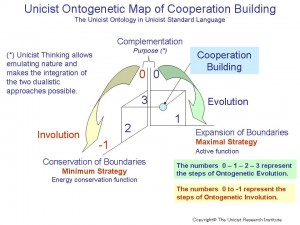The Unicist Logical Approach to Cooperation Building
Cooperation is defined as the building of a common space of complementation in which the expansion of the boundaries of the participants becomes possible, while the individual limits of the parts are respected in the generation of value.
 Cooperation is based on human gregarious instinct and is natural between groups of people who have decided to expand their boundaries.
Cooperation is based on human gregarious instinct and is natural between groups of people who have decided to expand their boundaries.
It is easily observable in the cooperation of countries and organizations of any kind. It adopts many shapes: collaboration, alliances, federations, confederations, etc.
Cooperation is not feasible in extreme individualistic or involving environments. In these environments competitiveness becomes extreme and cooperation is seen as a weakness.
This is a paradox that condemns these types of environments to live in a stagnated context with endless conflicts and/or conflict avoidance actions.
The driver of cooperation building is the need to generate additional value. This requires an extreme focus on the results that need to be produced, using an integrative logic to integrate the needs of the participants and the external goals to be achieved.
Therefore, the generation of additional added value is part of the nature of cooperative environments.
Peter Belohlavek
NOTE: TURI was the pioneer in using a logical approach to deal with evolution and became a private global decentralized world-class research organization in the field of human adaptive systems. http://www.unicist.org